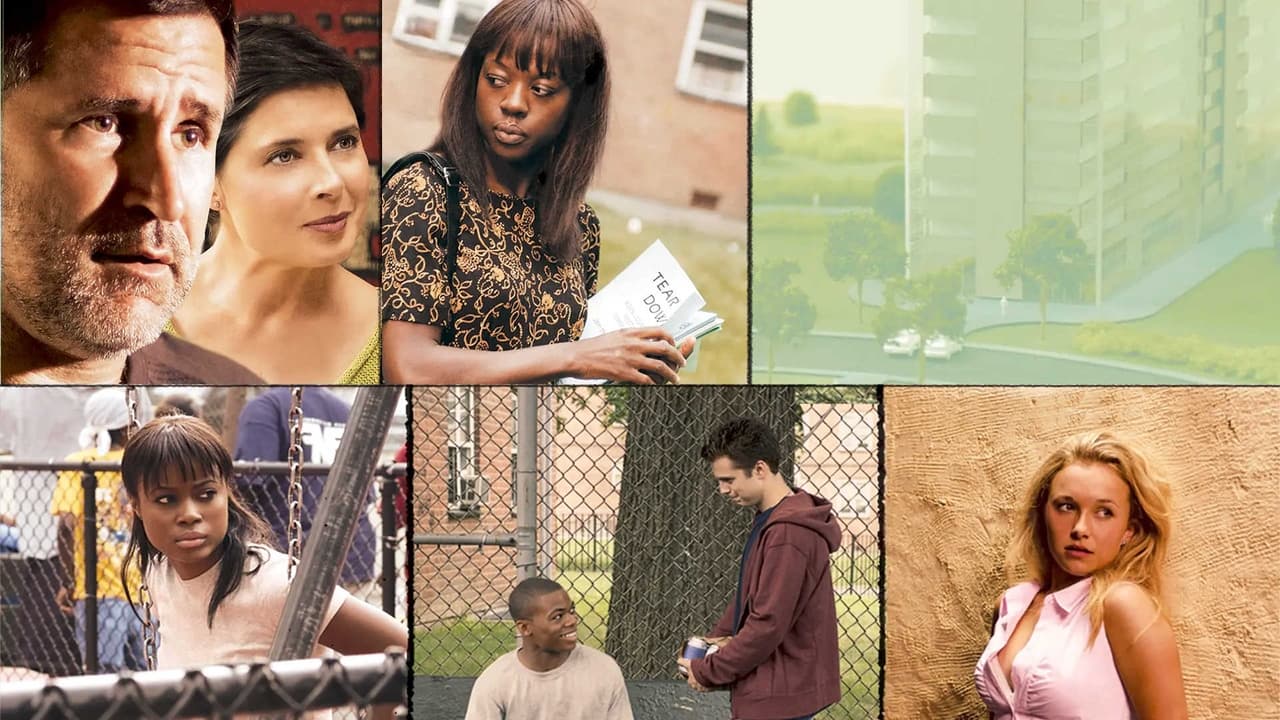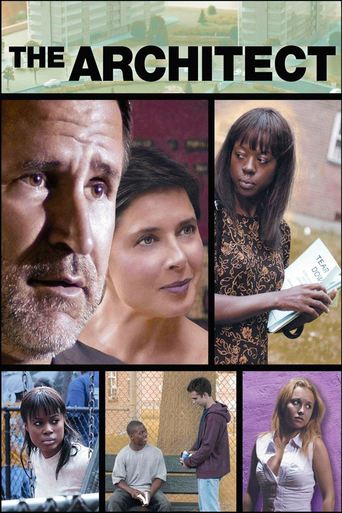

This is How Movies Should Be Made
... View MoreThe film makes a home in your brain and the only cure is to see it again.
... View Moreif their story seems completely bonkers, almost like a feverish work of fiction, you ain't heard nothing yet.
... View MoreThe film's masterful storytelling did its job. The message was clear. No need to overdo.
... View MoreI thought that the premise of the movie was very interesting and a good reflection of how living conditions, (less then the architecture itself) affect social interaction and psychology. The activist claims that people in the projects are "piled" on top of each other and I thought it was an accurate description of the reality of public housing. The rest of the movie was less interesting and confusing at times. The mother and daughter characters were seemingly out of place, especially the mother's character. The sexual overtones were likewise somewhat difficult to connect with the story. I think more could've been done to develop what started off as a good story about a compelling urban issue.
... View MoreIn this film each unhappy family is, to a greater or lesser extent, the architect of its own demise.Many people have criticised the film for not saying much, or for being overloaded with story lines; for not following through or following through too explicitly. All in all it clearly confuses and divides people. I think there is a problem and it is not the movie that has the problem but the audience.This story touches on some of the last taboos in cinema namely the actual visualisation of homosexual sex, and even worse in the eyes of the beholders it addresses incest. The cross cultures/cross races thing seems to me to be a side issue to the main problem illustrated here which is that each unhappy family is unhappy in its own way to quote Tolstoy (apt here as Shawn the black homosexual is reading "Anna Karenina" at one point in the action, and like Anna unable to come to terms with himself and the world in which he lives, eventually commits suicide.)The film comes originally from a stage play set in Glasgow. Some of the dialogue has been lifted straight from the play and so can sound a little stilted, but in my opinion this device helps to maintain the necessary distance between the action and the audience. This plainly is an allegorical piece, each actor fulfils a function rather than a character but the story is none the worse for that; many art house movies do likewise. It is the subject matter here that is so difficult. As for the actual movie, it looks good, in fact is amazing considering it was shot in 20 days in New York masquerading as Chicago (I assume to keep the costs down). The acting by the whole ensemble is excellent. And I think one has to give Anthony LaPaglia especial praise as the Architect in question clearly in the grip of an incestuous passion. This cannot be an easy kind of role for any actor to play, but, as one has come to expect of Mr LaPaglia, he carries it off to perfection which may go a long way to explain the uncomfortableness felt by some moviegoers. Within his oeuvre this film seems almost like a companion piece to the more hopeful "Winter Solstice". My advice to anyone wishing to see "The Architect" would be to go along with an open mind, expect to be challenged and perhaps you'll come away with the same feelings as me, that this is a good film, a thought-provoking film but not one to watch just for the pure fun of it, go and see Mr LaPaglia's other current film "Happy Feet" if you want that!
... View MoreImagine yourself on a riverbank prodding mud with a stick; the dirt is unsettled, stirs in the water, settles down again. In this film we're introduced to a number of characters who cross paths, and whose conflicts overlap on occasion before settling to a passive resolution.The confrontation between the architect of a dilapidated housing project and a dissatisfied resident forms the central vein in a network of sadly uninteresting stories.There is no surprise, and no insight brought to the representation of a young girl who in alienation craves affection; nor to the truck driver who doesn't want to ruin her first time; nor to the teenage boy accepting he's gay, nor to the grieving mother in the projects and finally, there is no insight into the proud man who doesn't want to admit his ego blinds him. Here we find a few people we've all seen before. They barely talk to each other and - unlike real people - when they do talk they say exactly what you'd expect them to say. Don't be tricked into thinking this film is asking any kind of question about family or race. If that's true, what's the question? The pretentious and two-dimensional nature of this writing is most transparent in the final scene wherein the architect and his son meet on a rooftop in the projects. Finally they have something to talk about: through my actions I have been the architect of someone's suffering, but there was no indication that I should have done anything differently - like father like son? Well, here the film ends abruptly, safe, risk-free. Not taking risks in your writing is not especially clever, let's not make a point of it.And unlike any number of films where stronger character sketches guide the narrative, time is linear in this picture; you won't see events intertwining or taking place simultaneously, nothing is revealed as cause or effect. "Crash", to which this film has been compared, and "American Beauty" had engaging narrative formats that compelled you to unravel a mystery. A director is an architect of sorts, and the director of this film is just like the architect he depicts - he's merely housing people in a flat, familiar, boring rectangle. There's no drama or vision, so we have to ask: what's the function?
... View MoreI just saw this film last night at the Denver Film Festival and didn't think it was very good. From what I have read about the original play, that sounds like it would have been the better version to see. The dialog in this film did not sound real to me. The characters were not developed. I didn't understand why the mother was so unhappy. I couldn't believe, or have sympathy for, the daughter's choices. I didn't buy the relationship between the black boy and the white boy at all. The part of the story about black woman's family was more believable but still not explored enough. Also, I think most Chicagoans will have trouble with the veracity of some of the scenes. I lived all my life in Chicago until two years ago and, I'm sorry, white teenagers do not hang out in the projects. Nor do their white fathers go there at night and hang around on roof tops smoking cigarettes.
... View More